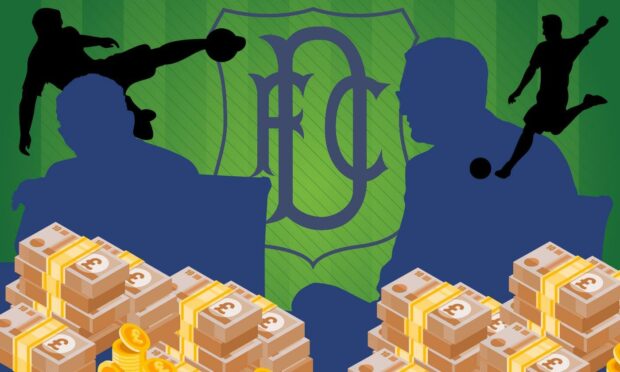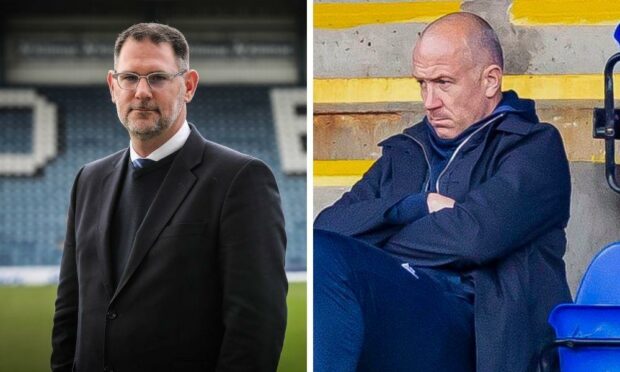Dundee’s failure to sort out their win bonus payments to players has leaked out of Dens Park.
Charlie Adam and John Nelms are attempting to strike a deal more than two months into a new season.
With money involved, it’s perhaps surprising this sort of story doesn’t break more often, particularly when you consider the competing priorities on either side of the negotiating table.
Also, in the goldfish bowl of Scottish football, players, as in Dundee’s case, invariably know exactly what their peers are banking.
Courier Sport spoke to a club chief, a captain and a player to find out more about the secret world of bonus negotiations, what has changed over the years and how they can go wrong.
The man in charge
In the old days it used to be that you had to have a bonus sheet submitted by a certain date for all competitions.
Wins, draws, getting to whatever stage of a cup – all that had to be done in advance of a competition getting underway for obvious reasons.
That stopped a manager asking on a Friday afternoon if he could offer the players another few quid to get them fired up for a must-win game.
Before these bonus sheets there were plenty of managers who were famous for saying: ‘We’ve got a cup game on Saturday – is it 300 quid for a win? And that goes for the manager as well, aye?’
Nowadays, it’s normal for a manager to sit down with the captain and maybe a couple of other senior pros and then bring it to the CEO.
And then for the CEO to reply through the manager.
You would normally expect it to have been sorted out in pre-season.
Their individual bonuses are in their own contracts, same as the basic wage would be.
And they can vary significantly. There’s not a uniform structure.
Cup games are different.
The win bonus is standard – whatever that may be.
For something like the Scottish Cup you would imagine it would get bigger and bigger with every round – say for example £250 to win the first game, £500 to get to the quarter-final, £1,000 to win the semi-final, that sort of thing.
The captain
There are usually two of us who go into the negotiations.
In my experience the league game bonuses are settled quickly but the cup games and the position you finish in the league could take longer.
And a bonus for playing Rangers or Celtic in the cup needs to be negotiated as well.
In a dressing room you’ll always have big mouths who’ll say before the meeting ‘ask for this’ and ‘ask for that’ or ‘don’t settle for this’.
Bonuses don’t motivate me.
I’ll fall-out with players and have a right go back if they say: ‘We’re not playing for that’.
My answer is: ‘Well don’t turn up on Saturday and hand your wages back for the week’.
Don’t get me wrong, it’s great when you get good bonuses. But bonuses don’t motivate me. That’s the same for most players.
I’ve heard about a manager going to a chairman to say boys were refusing to play because their win bonuses weren’t high enough for a certain game.
Yes, you try and get the best deal you can, but my opinion has always been that bonuses are what a club can afford and that’s what we need to accept.
The manager
You have to be involved in the discussions.
For me, if the win bonuses are the same for everybody it’s easier that way.
Personally, I’d rather there weren’t goal bonuses, clean-sheet bonuses and things like that, because the way I see it, it’s your job to keep the ball out of the net or to score.
When you’re talking about the lower leagues, clubs that get to the play-offs will have a problem if every possible scenario isn’t sorted out at the start of the season.
The last thing they need at Dens right now… https://t.co/rCb8BqzmS5
— George Cran (@di_cranio) October 5, 2021
Even then, though, you’ll always get players who’ll chance it and say: ‘We’ve got a sell-out crowd for the play-offs, how much are we getting now?’
You want to strike a balance of incentivising them and keeping a happy squad but being realistic about the club’s limits.
The worst one is – and I know this has happened – players who have been poor all season and are part of a team in a relegation battle going to a manager and asking: ‘What do we get for staying up, gaffer?’
Absolutely ridiculous.
That’s when a captain needs to be strong and say: ‘Hang on a minute, we’ve been awful all year, we’re fighting relegation and it’s up to us to keep the club in the league’.

